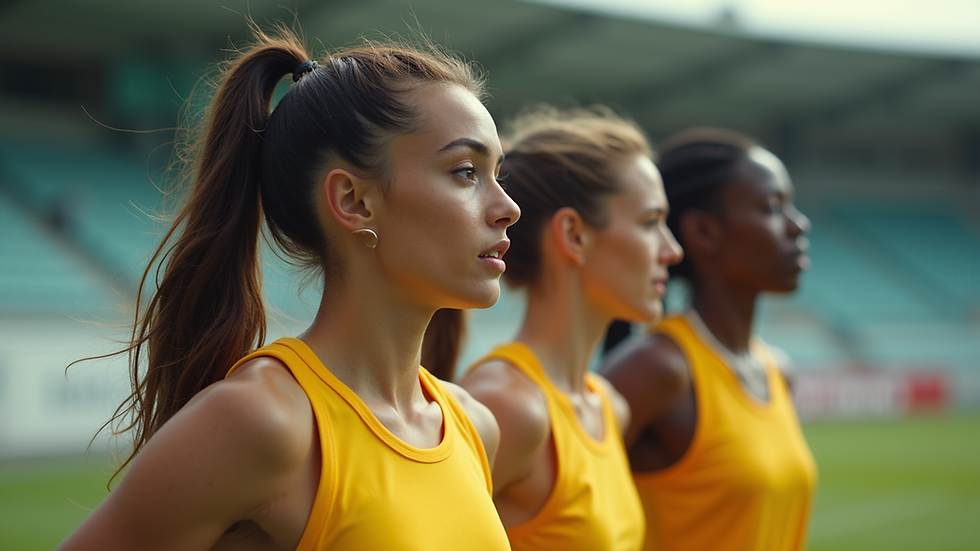Unveiling the Köhler Effect: Enhancing Team Performance Through Social Comparison in Sports
- Dr Paul McCarthy

- Jun 18, 2025
- 4 min read
In the world of sports, the focus often leans towards individual talent. However, teamwork and collaboration are crucial elements that can make or break a team's success. One fascinating psychological concept that helps explain this dynamic is the Köhler Effect. This phenomenon reveals how individuals tend to perform better in group settings when they feel their efforts contribute to a shared goal. When paired with social comparison, the Köhler Effect can lead to significant improvements for both athletes and their teams.
Understanding the Köhler Effect
The Köhler Effect, named after German psychologist Otto Köhler, indicates that individuals exert greater effort in group settings when their performance is compared to that of their peers. This motivation is largely driven by the fear of being the "weak link" in the group. When athletes recognize that their contributions are essential for the team's success, they often rise to the occasion.
For instance, a study involving rowers showed that those who rowed together in teams experienced an increase in their exertion levels by an average of 10% compared to rowing solo. This illustrates how the presence of teammates can elevate performance, pushing athletes to achieve more than they would alone.
The Role of Social Comparison
Social comparison theory, developed by psychologist Leon Festinger, explains that individuals assess their self-worth by comparing themselves to others. In sports, athletes routinely measure their skills and performances against both teammates and opponents, using these benchmarks as motivation to improve.
When combined with the Köhler Effect, social comparison becomes an even more powerful motivator. For example, a basketball player may feel inspired to improve their free throw percentage after watching a teammate sink 90% of their shots. This creates a motivating environment that fosters growth for both individuals and the team as a whole. The camaraderie and competition generated by these comparisons encourage athletes to strive for excellence.
Benefits for Athletes
The synergy between the Köhler Effect and social comparison brings several benefits for athletes:
Enhanced Motivation
The Köhler Effect inherently boosts motivation within a team. The knowledge that their efforts directly impact the team's success encourages athletes to push beyond their limits. For example, a soccer team that has a clear goal of reaching the championship can see individual players elevate their training intensity by up to 20%, benefiting not just themselves, but the entire squad.
Improved Performance
Seeing their peers working hard can compel athletes to elevate their own effort levels. When a swimmer trains alongside teammates who consistently improve their times, they are more likely to push themselves, creating a ripple effect that enhances the performance of the entire group. Such collective effort results in overall stronger performances during competitions.
Psychological Resilience
In competitive sports, mental strength is vital. The dynamics fostered by the Köhler Effect help athletes build resilience. Facing challenges as part of a team encourages a growth mindset. For instance, a volleyball team that experiences a difficult loss together is more likely to adapt and come back stronger in future matches due to the support provided by teammates.
Stronger Team Dynamics
The Köhler Effect promotes a culture of support within teams. In this nurturing atmosphere, athletes celebrate one another’s achievements and provide assistance when needed. This type of teamwork plays a significant role in enhancing team spirit, leading to a more cohesive unit during competitions.

Advantages for Teams
The benefits of the Köhler Effect and social comparison extend beyond individual athletes to impact entire teams:
Cohesion and Unity
When athletes recognize that their contributions matter, it fosters a sense of belonging and trust within the group. Data shows that teams with strong cohesion experience 25% fewer communication errors during games. A united team is better equipped to maintain focus and resilience during crucial moments.
Increased Accountability
The Köhler Effect instills responsibility among team members. As awareness grows that each athlete's performance influences the group, they take training and preparation more seriously. This promotes a dedicated and disciplined culture, which is essential for success.
Enhanced Strategic Planning
The motivation derived from social comparison encourages teams to set ambitious collective goals. For instance, teams that actively compare their performance metrics often develop strategic plans that leverage the strengths and weaknesses of each member. This collaborative approach optimizes competitive advantages and enhances decision-making during games.
Long-term Success
The combined benefits of heightened motivation, enhanced performance, and improved team dynamics position teams for lasting success. When athletes challenge one another while providing support, the team is likely to achieve significant results over time, both in and out of competition.

Final Thoughts
The Köhler Effect and social comparison are vital components for boosting team performance in sports. By understanding and utilizing these psychological concepts, athletes can enhance their motivation, performance, and teamwork. Teams that embrace this knowledge can position themselves for greater success, creating an environment of support and camaraderie that drives everyone to reach their full potential.
As sports evolve, teamwork remains essential. The Köhler Effect illustrates how individual greatness often stems from collective effort. Athletes and teams should harness this understanding, using social comparison and shared motivation as tools to achieve unprecedented heights in performance.








